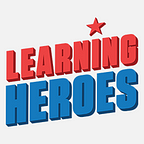Going Beyond Good Grades: What if Parents Knew What Teachers Know?
By Bibb Hubbard
Last week, I met an incredible mom. Shellina Semexant, a proud mother of 3 from Boston, shared her story with me and a room full of strangers as my non-profit, Learning Heroes, revealed new research on parents and teachers. She opened the meeting reflecting on the moment she realized her 3rd grade daughter was reading at the same level as her 1st grade son.
“I was hurt and sad, and felt like I failed my daughter” Shellina said. “My third grader was below grade level in both reading and math and no one notified me. I told [her school] that my daughter’s report cards showed that she met expectations. That is when they informed me that report cards do not reflect a child’s academic level.”
Luckily for her daughter, Shellina intervened once she knew the truth.
Most parents would have a similar response to the news that Shellina was finally given, and like Shellina, then pursue a different approach to their child’s learning. However, most parents don’t have access to this kind of information. In fact, when K-8 parents from across the country are surveyed, nine in ten (regardless of race, income, or education level) report that their child performs at or above grade level in both reading and math, while K-8 teachers report that less than a third of their students arrive at school prepared for grade level work[1].
Learning Heroes’ new report, Parents 2018: Going Beyond Good Grades, surveyed parents and teachers of children in grades 3–8, digging into questions sparked by this finding: What if parents knew what teachers know about their child’s academic performance? What if report cards were a true lever for parent-teacher communications? How can we incent conversations about a child’s academic progress, especially if that child isn’t performing at grade level?
Not surprisingly, when asked how they know if their child is achieving, parents place report card grades at the top of the list. Just as when they went through school, report cards remain the primary measure available to parents. Sixty-four percent say their children get As and Bs on their report card; and 84% believe that As and Bs mean their child is performing at grade level.
What was surprising was listening to teacher after teacher in qualitative interviews say that report cards measure effort more than achievement and are not the best reflection of grade level mastery. From our online poll, teachers rank report cards as the third most important way to know if a child is achieving; less important than ongoing communications with the teacher and graded work. In fact, 48% of teachers say report cards measure effort more than achievement; two-thirds say report card grades also reflect progress over the grading period, participation or engagement in class, and effort, in addition to mastery of academic content.
Teachers have much more data at their fingertips than parents do — from graded work on assignments to frequent diagnostic assessments measuring math and reading levels to teacher-made tests and quizzes. However most of our public-school systems are not currently designed to support parents and teachers in building trusting relationships to be able to have two-way, action-orientated conversations using available data.
In a national survey by the Data Quality Campaign, 75% of teachers said they’d like their school to do a better job of getting parents information about their student’s progress. But less than half of teachers in our survey reported that they have had formal training or workshops on how to have difficult conversations with parents. And in interviews, teachers said they often don’t have the time or structures in place to have conversations about performance.
Students’ effort, progress, and engagement in class are essential components of a child’s learning. We all want those things for our children. But without a clear picture of whether their children are actually performing at grade level — and therefore on track to the college aspirations that 80% of parents report having for their children — parents can’t partner as effectively with teachers to help their children succeed.
Together with many education partners, as well as state and district leaders, Learning Heroes is exploring research-based tools and resources to help close these communications and data gaps and evaluate the range of possibilities to begin breaking down some of these barriers.
We can and should do better for Shellina and her family — for all parents, teachers, and critically the children we work so hard to educate and develop into successful adults. Of all the rich data for this latest report the most salient point is this: Together, we can solve this.
[1] Scholastic Teacher & Principal Survey, 2016
